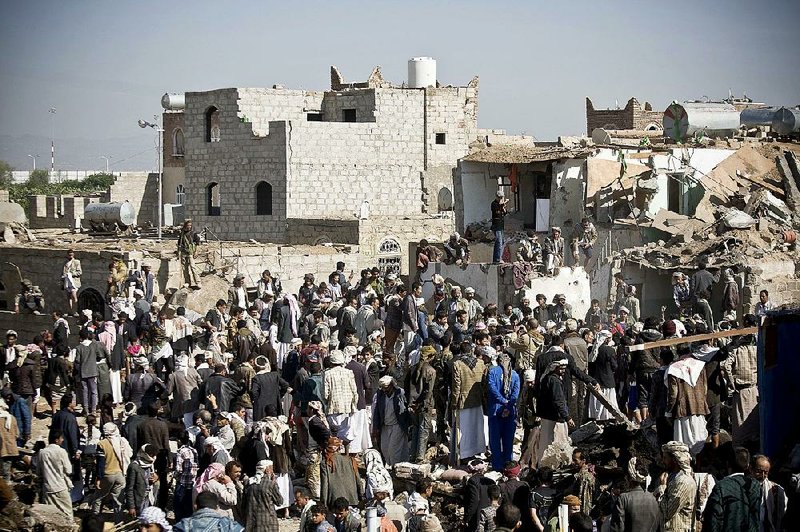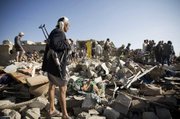SANAA, Yemen -- Saudi Arabia bombed key military installations Thursday in Yemen, leading a regional coalition in a campaign against Shiite rebels who have taken over much of the country and driven out the president.
Egyptian military and security officials said the military intervention will go further, with a ground assault into Yemen by Egyptian, Saudi and other forces planned once airstrikes have weakened the capabilities of the rebels, known as Houthis, and their allies, military forces loyal to the former president, Ali Abdullah Saleh.
The strikes that began before dawn barraged Sanaa and three other provinces, hitting a Sanaa air base, military bases and anti-aircraft positions and flattening a number of homes near Sanaa's airport, killing at least 18 civilians. A new round of strikes began Thursday evening.
In an angry, televised speech Thursday night, the rebel leader Abdul-Malik al-Houthi accused the United States, Saudis, and Israel of launching a "criminal, unjust, brutal and sinful" campaign aimed at invading and occupying Yemen.
"Yemenis won't accept such humiliation" he said, calling the Saudis "stupid" and "evil."
White House spokesman Eric Schultz said President Barack Obama authorized logistical and intelligence support for the strikes but that the U.S. is not joining with direct military action.
Iran, which is allied to the Houthis, denounced the strikes, noting the civilian deaths.
Iran "considers this action a dangerous step," Foreign Ministry spokesman Marzieh Afkham said in a statement. "This invasion will bear no result but expansion of terrorism and extremism throughout the whole region."
The sudden internationalization of the Yemen conflict brewing for months throws a new convolution in the twisted threads of conflict in the Middle East.
The new tension puts the United States, a traditional ally of Saudi Arabia, in a precarious situation with Iran, as the U.S. tries to negotiate a nuclear deal with the majority-Shiite country before the end of this month.
In Iraq, the U.S. and Iran are implicitly on the same side -- both helping the Shiite-led government in Baghdad battle Islamic State militants, though Tehran and Washington are intently avoiding any actual contacts.
In Yemen, the U.S. is backing Saudi Arabia and its Persian Gulf allies against the Shiite rebels, who are allied to Iran, while at the same time, al-Qaida's branch in the country also is fighting the Shiite rebels. The same al-Qaida branch has launched failed attacks against America in the past.
Saudi Arabia and fellow Sunni-led allies in the Persian Gulf and the Middle East view the Houthi takeover as a move by Iran to establish a proxy on the kingdom's southern border. Iran and the Houthis deny that Tehran arms the rebel movement, though Tehran says it gives it diplomatic and humanitarian support.
In a pre-dawn statement as the airstrikes began, Saudi Arabia, Kuwait, Emirates, Qatar and Bahrain said their action aimed to "protect" Yemenis from Houthis who are "a tool in the hands of foreign powers."
Over the past months, the Houthis have swept out of their northern strongholds to take over the capital and much of the north.
The U.S.- and Persian Gulf-backed president, Abed Rabbo Mansour Hadi, was forced to flee to the southern port of Aden, hoping to cling to authority with the backing of some police and military units and allied militiamen. As the Houthis and their allies bore down on Aden, Hadi left the country by boat Wednesday, security officials said.
Hadi reappeared Thursday evening, arriving by plane at an air base in the Saudi capital, Riyadh, Saudi state TV reported.
A Yemeni security official said Hadi went by boat to the Yemeni port of al-Mukalla in the western province of Hadramawt, where he spent the night. The next day, he drove across the border into neighboring Oman and from there flew to Riyadh.
The official spoke on condition of anonymity because he was not authorized to release the information.
Hadi is expected to attend a planned Arab summit in the Egyptian resort of Sharm el-Sheikh that begins Saturday. The Yemen conflict is now expected to dominate the meetings.
The Houthis have succeeded in their advance in large part because of help from Saleh, the autocrat who ruled Yemen for more than 30 years until he was ousted after a 2011 Arab Spring popular uprising.
Saleh remained in the country after this ouster, and some of the strongest military units remained loyal to him, undermining Hadi. Those units are now fighting alongside the Houthis.
The airstrikes appeared to give new spirit to military units and militiamen loyal to Hadi, who had been quickly unraveling the past two days. In Aden, pro-Hadi militiamen battled in two districts with Houthi fighters backed by Saleh's forces.
In Sanaa, the Houthis lashed out as their fighters stormed the offices of at least three television stations and an independent newspaper they consider close to their opponents. Among them was the Qatari-owned Al-Jazeera TV station. The channel reported that militiamen broke surveillance cameras and damaged equipment.
Three Egyptian military and security officials said Thursday that a coalition of countries led by Egypt and Saudi Arabia will conduct a ground invasion into Yemen once the airstrikes have sufficiently diminished the Houthis and Saleh's forces. They spoke on condition of anonymity because they were not authorized to talk about the plans with the press.
Egypt's presidency said in a statement Thursday that its naval and air forces were participating in the coalition campaign already. Egypt is "prepared for participation with naval, air and ground forces if necessary," Foreign Minister Sameh Shukri said.
Foreign ministers preparing for the weekend Arab summit agreed on a draft program to create a new joint Arab defense force to intervene in regional crises, including possibly Yemen. The Egyptian security and military officials said the force is planned to include some 40,000 men backed by jet fighters, warships and light armor.
Information for this article was contributed by Sarah el Deeb and Maggie Michael of The Associated Press.
A Section on 03/27/2015

